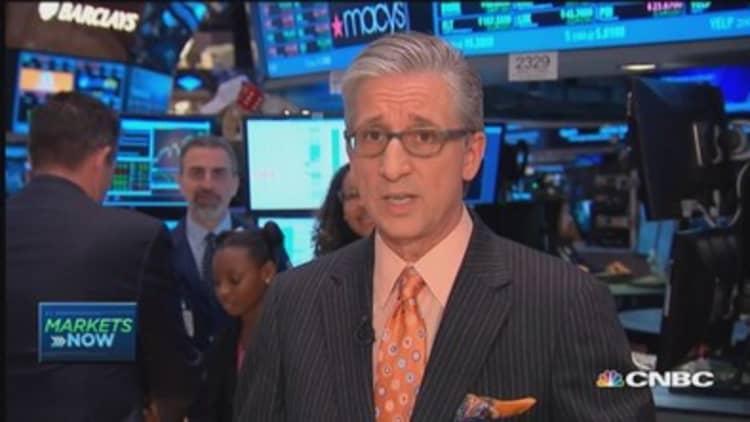
Is this the week initial public offerings finally get going? It's been a lousy start to the year for IPOs. In the first quarter of 2015, there were 34 deals worth $5.4 billion, half of the 64 deals worth $10.6 billion in the first quarter of last year, according to Renaissance Capital.
That's pretty poor, but here's one important point: The IPOs that have been issued are doing well. The Renaissance Capital IPO ETF, a basket of roughly 60 IPOs that have recently gone public, hit a new high Monday.
This may be the week the number of issues finally starts picking up. There is roughly $1.2 billion worth of deals seeking to price, the second biggest of the year, after the week of Feb. 2, when $1.3 billion priced due to the large master limited partnership deal involving Columbia Pipeline Partners.
Read More
Overnight, Ottawa tech company Shopify filed for an IPO of up to $100 million in New York and Toronto.
Also overnight, a well-regarded cancer immunotherapy firm, Aduro Biotech, priced 7 million shares at $17, well above the initial talk of 5 million at $14 to $16. The company leverages patients' immune systems to slow the growth and spread of tumor cells.
On Wednesday evening, three other companies are pricing: Etsy, Party City, and Virtu. All of them (oddly) are from the New York City area. All three have market caps exceeding $1 billion—$2.4 billion for Virtu, $1.9 billion for Party City, and $1.8 billion for Etsy. And while all are in different spaces they all have similar, favorable characteristics: strong cash flow and a leadership position in their respective markets.
1) Etsy, planning to price tonight for trading tomorrow on the Nasdaq, is getting most of the attention as it seeks to raise 16.7 million shares at $14 to $16. It's an online marketplace for handmade goods, making it a good play on the emerging freelance economy. It's still losing money but has a very loyal following, largely but not exclusively made up of women.
How loyal? Etsy was founded in 2005, but in 2014 sales were still growing 50 percent. Of the buyers in 2011, 45 percent are also buyers in 2014, according to Renaissance Capital.
That's good retention.
Read MoreI worry about Fed-induced asset bubbles: Paulson
In keeping with its general ethos, Etsy is also trying to get shares in hands of small retail holders. It has supposedly set aside 5 percent of shares for the Etsy community and other individual investors. It will be interesting to hear more on how Morgan Stanley, the lead book runner, handled that.
2) It may sound a bit whimsical, but Party City Holdco is pretty serious, seeking to raise 21.9 million shares at $15 to $17. The company is the leading party goods retailer in North America. It has 880 stores and claims it is "the only coast-to-coast network of party superstores in the U.S. and Canada."
And Party City doesn't just sell in its stores. Because the company makes something like 70 percent of the products it carries, is is also a big distributor of party goods to independent stores and mass merchants.
It's a mature company, but Party City executives believe they can expand through new store openings. Comparable store sales growth was 5.8 percent for the year ending Dec. 31.
Sales, of course, are bunched around the calendar. For example, 25 percent of sales are related to Halloween. Metallic balloons account for 12 percent of sales (they last longer).
Read MoreCramer: Exploit this—a rare moment for oil & retail
The closest peer is probably crafts retailer Michaels. Shares in the company are up 60 percent from its IPO last year.
One last point: This is a Thomas Lee deal.
3) Finally, there's Virtu Financial, a market maker and financial intermediary firm, seeking to raise 16.5 million shares at $17 to $19. Virtu was preparing to go public at this time last year, but it postponed the deal due to the furor over publication of Michael Lewis's Flash Boys, which told the story of the firm's quest to correct what it saw as a market fixed in favor of high-frequency traders.
The firm attracted a lot of attention when it announced it had only one trading day of losses in 1,238 days of trading. But when you have a company that says it makes a market in more than 10,000 securities on 210 unique exchanges and markets in 30 countries, you are talking about millions and millions of transactions a day. Assuming there is even the tiniest of advantages—50 to 51 percent, say—it's almost impossible to lose money when the law of large numbers comes into play. The issue is how you get the advantage.
I will have a first-on-CNBC interview with Virtu founder and Chairman Vincent (Vinnie) Viola from the Nasdaq Thursday morning.


